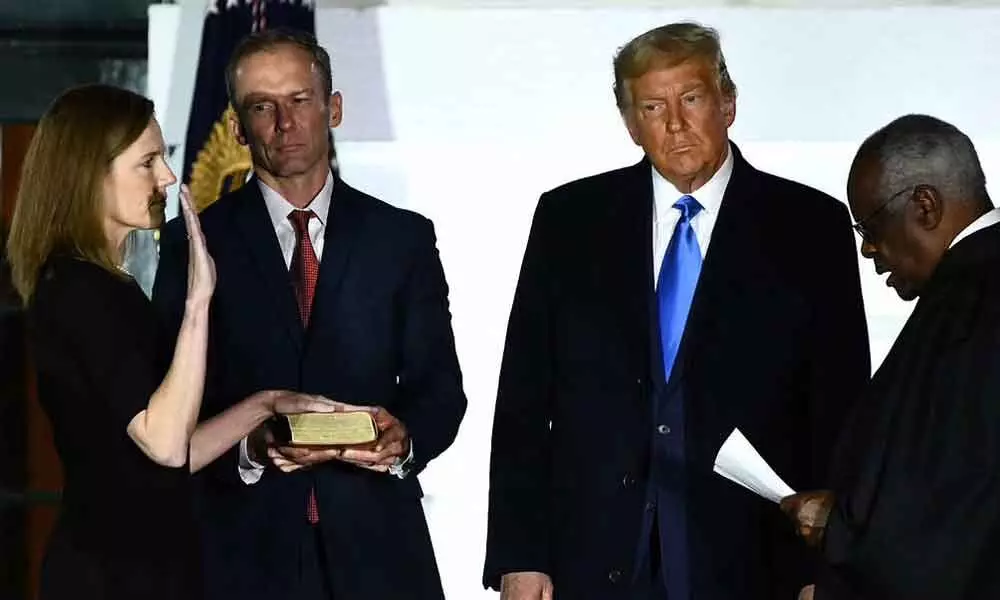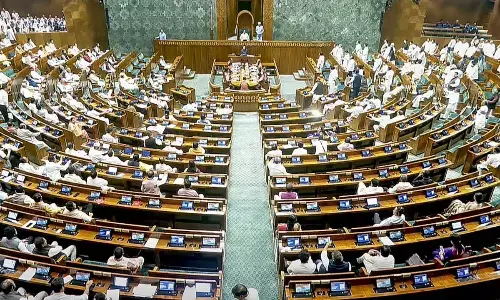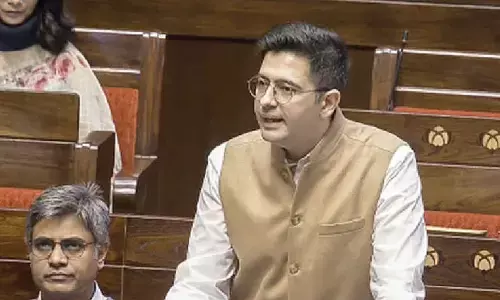Senate's approval for Barrett seals Trump's conservative Supreme Court legacy

Senate's approval for Barrett seals Trump's conservative Supreme Court legacy
Win or lose next week's election, US President Donald Trump has sealed his long-term legacy with the Senate approval of Amy Coney Barrett as the new Supreme Court Justice by getting three conservative judges on the bench entrenching it firmly on the right for years to come.
New York:Win or lose next week's election, US President Donald Trump has sealed his long-term legacy with the Senate approval of Amy Coney Barrett as the new Supreme Court Justice by getting three conservative judges on the bench entrenching it firmly on the right for years to come.
After receiving 52 votes of the Republican Party senators on Monday, just eight days before the presidential election, Barrett was sworn-in at a White House ceremony, where she declared: "A judge declares independence, not only from Congress and the President, but also from the private beliefs that might otherwise move her."
And Trump said: "Justice Barrett made clear she will issue rulings based solely upon a faithful reading of the law and the Constitution as written, not legislate from the bench."
Those were attempts to rebut criticism of Barrett for her conservative views by Democrats who opposed her nomination.
All 47 of them voted against her nomination and were joined by one Republican, Susan Collins, who is facing re-election from Maine, a liberal state.
With her addition to the bench, three of the six conservatives will be Trump's nominees setting the nine-member court firmly on that side of the ideological divide.
A conservative judge, Clarence Thomas, who is African-American, gave Barett the ceremonial oath of office less than two hours after her nomination was approved by the Senate.
But she will be formally sworn-in on Tuesday at the Supreme Court by Chief Justice John Roberts.
Much to the dismay of the liberals, Barrett succeeds former Democratic President Bill Clinton's nominee Ruth Bader Ginsburg,the resounding voice of liberalism on the bench who died last month after a 27-year Supreme Court career studded with liberal opinions.
Barrett was a law professor before she became a judge of a federal circuit court, which functions as an appeals court with multi-state jurisdiction just below the Supreme Court.
Only the fifth woman to serve on the Supreme Court, she is only 48 years old with the possibility of a long stint in the nation's highest court.
She has seven children, two of them of African-descent adopted from Haiti.
Besides her conservative background, the Democrats had also opposed the appointment of Barrett so close to the election citing the Republicans scuttling former President Barack Obama's nomination of Merrick Garland to the Supreme Court in an election year by claiming that it should be the prerogative of the new president.
Democratic Vice Presidential nominee Kamala Harris, a member of the Senate who voted against Barrett, tweeted that the confirmation was "an illegitimate process" which "we will not forget".
The Republican Senate majority leader Mitch McConnell flipped from his 2016 stand asserting this time the legal right of the sitting president to make nominations and for the Senate to approve it.
"We don't have any doubt, do we, that if the shoe was on the other foot, they'd be confirming?" McConnell said before the vote.
Should their nominee Joe Biden win the election, Democrats have suggested enlarging the size of the court and adding more judges to reverse the conservative dominance.
Judges at all levels in the US tend to decide along ideological lines in cases that have policy consequences, although in many instances they also cross the divide on principle.
Biden, who has not quite affirmed his stand either way, has said that he would appoint a commission to look into the issue.
One of the worrisome factors for the Democrats is that the court may be called on to resolve cases involving the November 3 election as it had in the close election in 2000 in which Republican George W. Bush was declared the winner over Democrat Al Gore despite polling fewer popular votes.
The court refused to get involved in a Florida court decision that helped Bush get the electoral college votes needed to become president.
The court is likely to rule on issues important to the Democrats like continuing with nation-wide legalisation of abortion, the future of the national health insurance programme introduced by Obama, and various immigration issues.
Vice President Mike Pence, who is the president of the Senate, stayed away from the confirmation session.
He has been exposed to Covid-19 by his Chief of Staff Marc Short who tested positive for coronavirus along with at least four other staffers.
Democrats said he should not come to the chamber warning that his "presence alone could be very dangerous to many people".
After publicly denouncing Barrett's nomination, the Democrats did not put up much of a fight in the Senate.
Senator Diane Feinstein, the Democratic leader on the Senate Judiciary Committee which gave the preliminary approval for Barrett's nomination, was criticised by party colleagues for not opposing it more vigorously.
"I've had a long and serious talk with Senator Feinstein," Chuck Schumer, the Democratic leader in the Senate, said afterwards.
Feinstein had earlier been criticised for making negative comments about Barrett being a Catholic.
She had told her during the hearings for her circuit court nomination,: "The dogma lives loudly within you."
Barrett's Catholic religion is a factor in US politics because nation-wide right to abortions is not a settled issue and abortions are opposed by the Catholic Church, as well as Protestant Christian fundamentalists.
The court may have to rule on cases involving certain aspects of abortions like some states tightening the regulations to a degree that it almost becomes unavailable.
The composition of the US Supreme Court is unusual because it has only one member, Trump nominee Neil Gorsuch, who is a Protestant Christian in a country where a majority belong to it, and even he grew up a Catholic before switching to the Episcopal sect.
Including Barrett, six judges will be Catholics and two Jewish.
Barrett conforms to Trump's anti-elite populism, as she will be the only justice on the Supreme Court without an Ivy League degree, which McConnell mentioned before the vote.



















